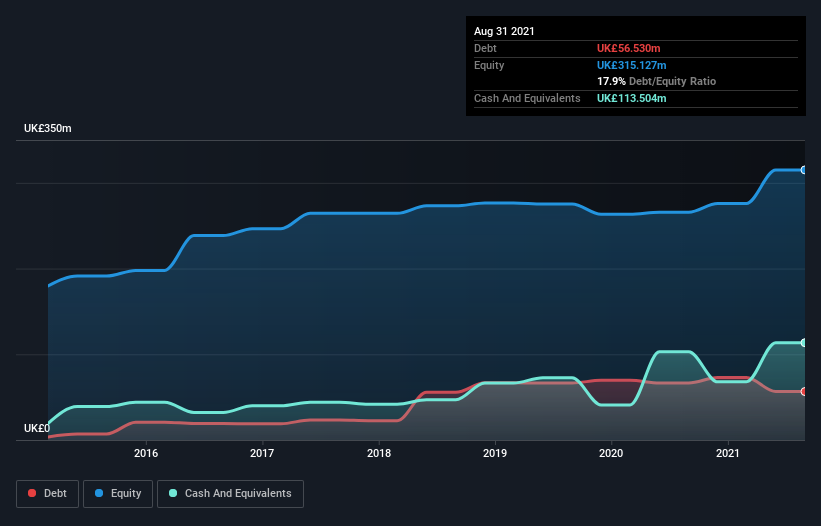Legendary fund manager Li Lu (who Charlie Munger backed) once said, 'The biggest investment risk is not the volatility of prices, but whether you will suffer a permanent loss of capital.' So it seems the smart money knows that debt - which is usually involved in bankruptcies - is a very important factor, when you assess how risky a company is. Importantly, Vertu Motors plc (LON:VTU) does carry debt. But is this debt a concern to shareholders?
When Is Debt Dangerous?
Debt assists a business until the business has trouble paying it off, either with new capital or with free cash flow. Ultimately, if the company can't fulfill its legal obligations to repay debt, shareholders could walk away with nothing. However, a more frequent (but still costly) occurrence is where a company must issue shares at bargain-basement prices, permanently diluting shareholders, just to shore up its balance sheet. Of course, the upside of debt is that it often represents cheap capital, especially when it replaces dilution in a company with the ability to reinvest at high rates of return. When we think about a company's use of debt, we first look at cash and debt together.
View our latest analysis for Vertu Motors
What Is Vertu Motors's Net Debt?
As you can see below, Vertu Motors had UK£56.5m of debt at August 2021, down from UK£66.5m a year prior. But on the other hand it also has UK£113.5m in cash, leading to a UK£57.0m net cash position.

How Strong Is Vertu Motors' Balance Sheet?
We can see from the most recent balance sheet that Vertu Motors had liabilities of UK£515.9m falling due within a year, and liabilities of UK£156.6m due beyond that. Offsetting this, it had UK£113.5m in cash and UK£43.0m in receivables that were due within 12 months. So it has liabilities totalling UK£515.9m more than its cash and near-term receivables, combined.
This deficit casts a shadow over the UK£232.2m company, like a colossus towering over mere mortals. So we'd watch its balance sheet closely, without a doubt. After all, Vertu Motors would likely require a major re-capitalisation if it had to pay its creditors today. Given that Vertu Motors has more cash than debt, we're pretty confident it can handle its debt, despite the fact that it has a lot of liabilities in total.
Even more impressive was the fact that Vertu Motors grew its EBIT by 292% over twelve months. That boost will make it even easier to pay down debt going forward. There's no doubt that we learn most about debt from the balance sheet. But it is future earnings, more than anything, that will determine Vertu Motors's ability to maintain a healthy balance sheet going forward. So if you want to see what the professionals think, you might find this free report on analyst profit forecasts to be interesting.
Finally, a company can only pay off debt with cold hard cash, not accounting profits. While Vertu Motors has net cash on its balance sheet, it's still worth taking a look at its ability to convert earnings before interest and tax (EBIT) to free cash flow, to help us understand how quickly it is building (or eroding) that cash balance. Happily for any shareholders, Vertu Motors actually produced more free cash flow than EBIT over the last three years. That sort of strong cash conversion gets us as excited as the crowd when the beat drops at a Daft Punk concert.
Summing up
Although Vertu Motors's balance sheet isn't particularly strong, due to the total liabilities, it is clearly positive to see that it has net cash of UK£57.0m. And it impressed us with free cash flow of UK£59m, being 107% of its EBIT. So we don't have any problem with Vertu Motors's use of debt. When analysing debt levels, the balance sheet is the obvious place to start. But ultimately, every company can contain risks that exist outside of the balance sheet. Be aware that Vertu Motors is showing 3 warning signs in our investment analysis , and 1 of those can't be ignored...
If you're interested in investing in businesses that can grow profits without the burden of debt, then check out this free list of growing businesses that have net cash on the balance sheet.
New: Manage All Your Stock Portfolios in One Place
We've created the ultimate portfolio companion for stock investors, and it's free.
• Connect an unlimited number of Portfolios and see your total in one currency
• Be alerted to new Warning Signs or Risks via email or mobile
• Track the Fair Value of your stocks
Have feedback on this article? Concerned about the content? Get in touch with us directly. Alternatively, email editorial-team (at) simplywallst.com.
This article by Simply Wall St is general in nature. We provide commentary based on historical data and analyst forecasts only using an unbiased methodology and our articles are not intended to be financial advice. It does not constitute a recommendation to buy or sell any stock, and does not take account of your objectives, or your financial situation. We aim to bring you long-term focused analysis driven by fundamental data. Note that our analysis may not factor in the latest price-sensitive company announcements or qualitative material. Simply Wall St has no position in any stocks mentioned.
About AIM:VTU
Excellent balance sheet average dividend payer.
Market Insights
Weekly Picks


Crazy Undervalued 42 Baggers Silver Play (Active & Running Mine)


Fiducian: Compliance Clouds or Value Opportunity?

Willamette Valley Vineyards (WVVI): Not-So-Great Value
Recently Updated Narratives


The "Molecular Pencil": Why Beam's Technology is Built to Win


ADNOC Gas future shines with a 21.4% revenue surge

Watch Pulse Seismic Outperform with 13.6% Revenue Growth in the Coming Years
Popular Narratives


MicroVision will explode future revenue by 380.37% with a vision towards success


NVDA: Expanding AI Demand Will Drive Major Data Center Investments Through 2026





